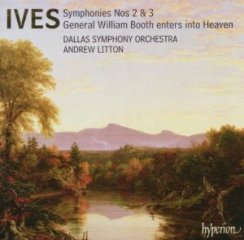Charles Ives - Symphonies 2 & 3 (2006)
Charles Ives - Symphonies 2 & 3 (2006)

1. Symphony No. 2, for orchestra, S. 2 (K. 1A2): Andante moderato 2. Symphony No. 2, for orchestra, S. 2 (K. 1A2): Allegro molto (con spirito) 3. Symphony No. 2, for orchestra, S. 2 (K. 1A2): Adagio cantabile 4. Symphony No. 2, for orchestra, S. 2 (K. 1A2): Lento maestoso 5. Symphony No. 2, for orchestra, S. 2 (K. 1A2): Allegro molto vivace 6. Symphony No. 3: The Camp Meeting, for orchestra, S. 3 (K. 1A3): Communion: Largo 7. General William Booth Enters into Heaven, for chorus, optional solo voice, chamber orchestra & percussion, S. 181 (K. 5B9) Dallas Symphony Orchestra Andrew Litton – conductor
Ives: Symphonies Nos. 2 & 3 is the second disc in Andrew Litton's cycle of Charles Ives' symphonies for the Hyperion label with the Dallas Symphony Orchestra. Of the two discs devoted to this series, this is better from a performance standpoint, as the first disc suffers from a so-so Symphony No. 4 even as it sports a terrific Symphony No. 1. The recorded sound here is something of a mixed bag as it is dark and fuzzy at the edges, although in terms of distance relative to volume it is very, very well made. In the Symphony No. 2, later movements are better than the earlier ones, with a stronger sense of pickup and forward momentum. The opening Andante moderato lacks focus and the strings are rather sludgy in the first two movements, but the brass section sounds very good in the Allegro molto vivace. The famous final discord, though, lacks punch. Hyperion's recording of the percussion parts in this Symphony No. 2 come through with more clarity than on any other recording.
Symphony No. 3 is probably the greatest of Ives' symphonies, so the bar for any recorded version is set very high indeed, particularly as there is a splendid, thoroughly transparent version made for Mercury Living Presence by conductor Howard Hanson that's hard to beat. Here Litton attempts to put some distance between himself from other recordings by observing strict adherence to the pacing of the symphony and utilizing many of Ives' suggested "shadow parts" -- discordant patches of music that are heard as if in a distance. In this instance, the recording's great sense of interior depth does work well, as these parts do not intrude on the main texture and are heard as "shadows," as Ives intended. It's a little harder to get used to the strict observance of tempo; most recorded versions don't make much of a distinction between the tempi of the three movements except that the second movement is a tad faster than the first. Here Litton spells it out and makes each movement roll at a distinct speed. It leaves one with a mixed impression, but overall it is a very good realization of the Symphony No. 3 and it demonstrates that this symphony, despite its grounding in a traditional style, is as open to nearly the same variety of interpretations as the ones that follow -- the Symphony No. 4 and the Universe Symphony.
John J. Becker's mini-oratorio-like arrangement of Ives' General William Booth Enters into Heaven was made at Ives' instigation in the mid-'30s as the composer by then did not have the stamina, or the eyesight, to see through to full fruition nine pages of sketches already at hand. It hasn't been recorded very often, although a very fine version was made for Columbia Masterworks in 1966 with Archie Drake singing the solo bass part with chorus and orchestra under the leadership of Gregg Smith, and this has never appeared on CD. With that recording, the solo singing was fabulous, but the orchestra and chorus were muddy and indistinct; here, the chorus and orchestra are just right -- especially the chorus -- but Donnie Ray Albert's bass is semi-buried and sounds "squashed." Despite such middling complaints, one must give credit where it is due and admit the choice of this work was a nice and imaginative touch as filler to these two symphonies. Litton's Hyperion set of Ives' symphonies, in sum, does put some pressure on Michael Tilson Thomas' set for CBS, even if it doesn't have the edge. ---Uncle Dave Lewis, Rovi
download: uploaded yandex 4shared solidfiles mediafire mega filecloudio nornar
Last Updated (Monday, 13 January 2014 22:07)








